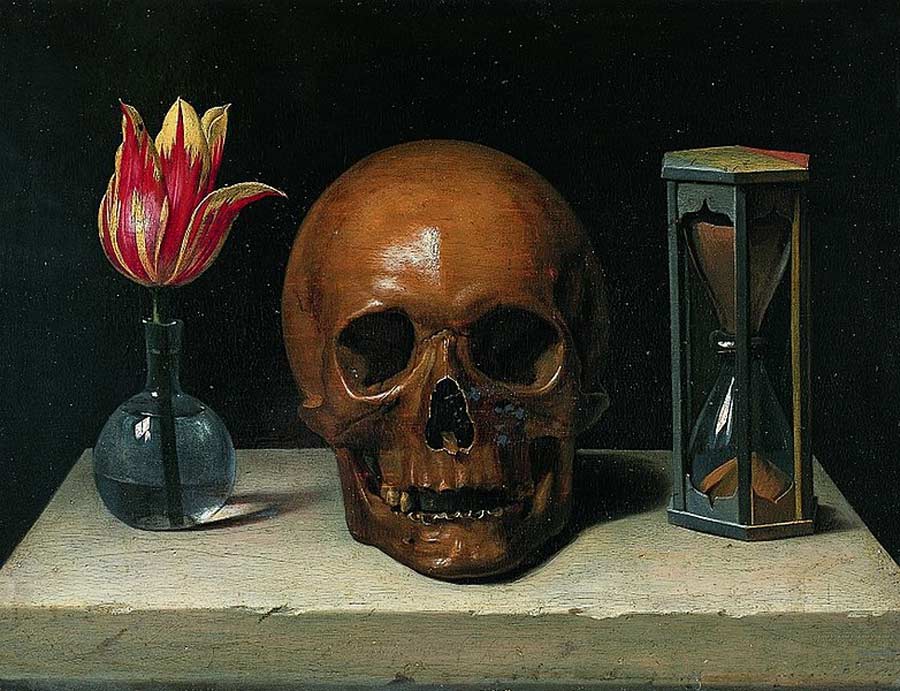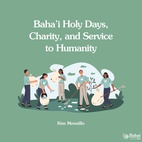The views expressed in our content reflect individual perspectives and do not represent the official views of the Baha'i Faith.
What if thinking about death wasn’t a scary, overwhelming thought, but one that informed how we live and the choices we make every day?
I’ve often had a hard time reconciling the idea of death and what a world without me would look like. Conceited as it may sound, I think that many of us struggle with leaving behind our material accomplishments, relationships, and experiences.
But I recently came across some Baha’i teachings and creative concepts that offered me great comfort, that helped me see life and death through the spiritual lens of the soul.
It started with the following words from Baha’u’llah, which provide a beautiful, hopeful glimpse of what we can look forward to in the next world:
Sorrow not if, in these days and on this earthly plane, things contrary to your wishes have been ordained and manifested by God, for days of blissful joy, of heavenly delight, are assuredly in store for you. Worlds, holy and spiritually glorious, will be unveiled to your eyes. – Baha’u’llah, Gleanings from the Writings of Baha’u’llah, p. 230.
What a relief to know that days of blissful joy and heavenly delight await us! As sad as it is for our loved ones to see us leave this earthly plain, it helps to know that holy and spiritual worlds await them as they enter the next world.
In another passage, Baha’u’llah asks why we grieve over death, calling it a messenger of joy:
I have made death a messenger of joy to thee. Wherefore dost thou grieve? I made the light to shed on thee its splendor. Why dost thou veil thyself therefrom? – Baha’u’llah, The Hidden Words, p. 11.
So what is the Baha’i perspective on life after death, and why is it viewed in such a positive light?
How Baha’is View Death
Baha’is believe that death cannot destroy the indisputable existence of the soul, originally brought to life at the moment of embryonic conception. The Baha’i teachings say the soul is not a physical entity, but it lives and travels with us wherever we go in this earthly life. Baha’is understand that when our physical body dies, our soul continues to progress through the spiritual worlds of God. Put simply, there is no “good” or “bad” place for souls in the next world—no physical heaven or hell. There is however, what Baha’is believe to be nearness to God, a constantly evolving condition of the soul as it travels nearer and nearer to the Creator once it detaches from our mortal frame.
Abdu’l-Baha, emphasises that viewing death as a process of annihilation is driven by our own human fear and causes debasement, limiting us to seeing death only from a material perspective, which in fact degrades our humanity. However, viewing death as an opportunity to acquire ideals and develop spiritual virtues helps us recognize that we are divinely created. From these teachings I’ve learned that dwelling, like I so often do, on those thoughts of nonexistence, actually weakens my soul’s ability to progress spiritually:
The conception of annihilation is a factor in human degradation, a cause of human debasement and lowliness, a source of human fear and abjection. It has been conducive to the dispersion and weakening of human thought, whereas the realization of existence and continuity has upraised man to sublimity of ideals, established the foundations of human progress and stimulated the development of heavenly virtues; therefore, it behooves man to abandon thoughts of nonexistence and death, which are absolutely imaginary, and see himself ever-living, everlasting in the divine purpose of his creation. He must turn away from ideas which degrade the human soul so that day by day and hour by hour he may advance upward and higher to spiritual perception of the continuity of the human reality. If he dwells upon the thought of nonexistence, he will become utterly incompetent; with weakened willpower his ambition for progress will be lessened and the acquisition of human virtues will cease. – Abdu’l-Baha, The Promulgation of Universal Peace, p. 88.
Baha’is understand that our souls’ spiritual development and progress in the next world largely depends on the life we live in this world, the God-given virtues we apply to our daily lives, and the choices we make. The Baha’i teachings give us a framework for action, which guides us to develop our soul spiritually, in preparation for when our soul separates from our body at the time of death. Baha’u’llah assures us that if we are faithful and obedient to his laws, and continue to develop our souls spiritually, we will attain a station that no mortal form can comprehend:
Thou hast, moreover, asked Me concerning the state of the soul after its separation from the body. Know thou, of a truth, that if the soul of man hath walked in the ways of God, it will, assuredly, return and be gathered to the glory of the Beloved. By the righteousness of God! It shall attain a station such as no pen can depict, or tongue describe. The soul that hath remained faithful to the Cause of God, and stood unwaveringly firm in His Path shall, after his ascension, be possessed of such power that all the worlds which the Almighty hath created can benefit through him. – Baha’u’llah, Gleanings from the Writings of Baha’u’llah, p. 82.
Memento Mori: Remember You Will Die
These concepts—walking in the ways of God and returning to the glory of the beloved—have recurred as powerful themes in art for thousands of years. The Baha’i perspective on death has interesting parallels with an ancient theory of visual cues common in art called Memento Mori, which is Latin for “remember death” or “remember you will die.” An art practice that became prominent in the seventeenth century, many modern artists have continued to explore this genre today. The term Memento Mori may have originally drawn its inspiration from the opening lines of the Book of Ecclesiastes in the Bible: “Vanity of vanities, saith the Preacher, vanity of vanities, all is vanity.” – Ecclesiastes 1:2.
Such a focus on the vanity of earthly life and the inevitability of death highlighted the need to perfect the character by cultivating inner virtues and turning our attention towards the immortality of the soul. Images that symbolize mortality—flowers, skulls, candles, bottles or an hourglass—featured in paintings in a time when almost everyone believed that life on Earth was merely a preparation for the afterlife. Although at first glance these images might seem arbitrary and grotesque, in actual fact, they had a very spiritual purpose. Many artists today continue to explore the meaning of life and life after death by including such images.
All Memento Mori artworks, including cultural celebrations like the Mexican Day of the Dead or the Buddhist practice of meditating on death called maranasati, offer a frequent reminder, through visual cues, that we are all going to die—but it’s what we make of this life that truly counts. Guiding us to focus on developing our souls by living a life of virtue builds stronger ties between this mortal world and the spiritual realm. We easily ignore the thought of death and dying due to our own human limitations, but artistic movements like Memento Mori offered us an opportunity to meditate and reflect on the importance of time, living a life of virtue and prioritizing good over evil. As Plato pointed out in Phaedra, death doesn’t make life pointless but rather purposeful—he said, as he recounted the death of his mentor Socrates, that the proper practice of philosophy deals with “… nothing else but dying and being dead.” It’s not about whether or not we’re going to wake up tomorrow, but about what we achieve in our waking moments.
The visual cues in Memento Mori art remind us that our work in this world involves developing strength of character and spiritual virtues, and Baha’u’llah’s revelation further emphasizes this truth by providing a framework for action. The Baha’i teachings remind us all that true life, the life of the soul, is immortal:
There is no annihilation, no destruction; therefore, the human spirit is immortal because it is not transferred from one body into another body. – Abdu’l-Baha, The Promulgation of Universal Peace, p. 306.


















Comments
Sign in or create an account
Continue with Facebookor